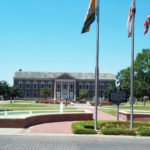How To Spend Your Summer as a Prospective Poli Sci Major

Student government, model UN, mock trial—it’s no question that there are countless extracurricular and academic options for high school students who are thinking of becoming Political Science majors in college. It’s not difficult to get involved with any and all of these activities during the school year, but what about when summer rolls around?
As a high schooler applying to college, your activities during the summer should serve two purposes. First, they should help you build a strong college application by highlighting your skills and dedication to your area of interest. Adcoms want students to demonstrate a strong sense of direction, so any steps that you take to try and differentiate yourself in the field of your choice will reflect positively on you. Second, the way that you spend your summer should also help you explore what you’re interested in—think of it as trying on different hats in order to see what fits you best. After all, the earlier you get to know what your interests are, the more steps you can take to try and distinguish yourself in this area and start achieving to your full potential.
There are endless possibilities for prospective Political Science majors to gain experience and learn more about themselves. Keep reading to learn about five different ways you could spend your summer!
Volunteer/Service Work
There are many volunteer and service opportunities available to prospective political science majors, both locally and abroad. This can be a great way to get experience working in a political science field and give back in a meaningful and long-lasting way. You should try to make your service relevant to the field you’re hoping to go into, so think political campaigns, non-profits, public policy, and human rights advocacy groups. The U.S. state department lists some volunteer organizations here.
To further contextualize the importance of meaningful community service, check out Harvard’s “Making Caring Common” initiative. Making Caring Common was established to try and change the admissions process and emphasize three categories: community engagement, assessment of ethical engagement and diversity, and relieving academic pressure and closing the economic opportunity gap. When planning your summer activities, you should keep in mind that the categories of MCC also mean you don’t necessarily have to spend a whole lot of money on extracurriculars for them to be meaningful—local work is just as effective as work done abroad or on a national scale.
Internships
Spending your summer at an internship is another great way to strengthen your college applications and gain helpful experience as a political science major. At an internship, you can shadow professionals in the field of your choice, whether it be law, government, or advocacy. This is one of the best ways to find out what the average day in the life of a professional working in politics may look like. Internships are a very valuable experience for students looking to weigh the pros and cons of a future job in PoliSci.
Since you’ll be surrounded by experienced and knowledgeable professionals in your internship, you should also use this opportunity to take advantage of their expertise: ask a lot of questions, find out why they went into political science, learn about how they chose a specialty. You can ask them about the good and bad sides of this potential career. The answers you will receive may be greatly helpful to you, since you’re getting honest information from a real individual in the field. Just as you would want to speak to a current student at a college or university before deciding to attend, it’s important that you talk to real individuals that are pursuing your potential career.
You can also use your time at an internship to make useful connections that can be helpful for attaining future internships (and maybe even jobs down the line). Be sure to always conduct yourself in a responsible and professional manner, as you might find yourself seeking a receive a letter of recommendation or a helpful reference to add to your resume later on.
When choosing the internships to which you’ll apply, remember that political science is a broad field, so there are lots of options: politics, law, government, community planning, advocacy groups. Similar to determining what type of volunteer work you’d like to do, when you’re looking into internships you should try to choose something that is meaningful to your personal interests and skills.
Summer Programs in Political Science Fields
Another useful way to spend your summer would be to participate in a summer program. There are many useful and prestigious programs available to high school students.
One of these programs is the National Student Leadership Conference on Political Action & Public Policy. Hosted at American University, the program aims to simulate the presidential campaign and the Senate and tour the inner workings of the government. There are college credit hours available for this program, which can be especially in terms of completing a major in Political Science.
There is also the Women & Politics Institute Summer Session for High School Students at American University. Georgetown has several options as well in American Politics, foreign policy, national security, and international relations.
Other options for summer programs include Emerson and Junior Statesmen of America. If at all possible, you should try to find a program at a school you’re interested in attending. These programs can be a great way to learn more about Political Science and create lasting, valuable relationships with peers and potential mentors.
Summer Programs in Student Leadership
Another good option for high school students interested in Political Science is to spend your summer involved with a program in student leadership. Leadership skills are invaluable regardless of what field you decide to go into, and these skills can be especially valuable in the context of political science. These are also helpful because they are both educational in nature and offer valuable networking opportunities. Again, you should try to find programs at schools that you are interested in. Be sure to check out National Student Leadership Conferences, Brown University Leadership Institute, Cornell: Inspiring Leadership, and Leadership Academy at Stanford.
Take College Level Classes
Last but not least, taking college level classes is always a productive way to spend your summer. These classes are a great way to get a taste of what classes in a Political Science major will be like, and it’s always good to gain experience doing the type of work that will be expected of you in college. You could take classes in Political Science as a high school student at BU, Georgetown, Babson, Barnard, Duke, and Northwestern, or at your local community college.
Final Thoughts
There are many, many summer opportunities available for high schoolers interested in political science, and they can be very helpful in terms of narrowing down your interests and exploring new subjects that may not be available to you in high school.
Although some of the options listed above have many benefits in terms of networking or even earning college credit, you should try to keep in mind that your primary concern should be exploring and discovering your interests. If you are serious about majoring in Political Science in college, it’s best to know right off the bat what this field is really like. As much as you may ask professionals questions about their careers, you should be asking yourself questions as well: What have you enjoyed and not enjoyed about your experiences in Political Science? What are your strengths and weaknesses in this field? Can you see yourself achieving and feeling fulfilled by this potential major/career? Why or why not?
Whether you’re considering a career in Political Science, English, Comparative Literature, Mathematics, or even Agriculture, remember that you’re not nailed down to anything just yet. As with any potential career path, you may find that things aren’t necessarily what you had expected them to be—but this isn’t a bad thing by any means. It’s always best to be able to narrow down your interests earlier rather than later. Any head start that you get in high school can turn out to be majorly beneficial to you in college and beyond, so you should feel excited about the prospect of spending your summer pursuing one of your interests and working towards your goals.
For more information on extracurriculars and creating a cohesive college application, check out these blog posts:
What Counts as an Extracurricular?
Creating a Cohesive Application: How to Stand out to Adcoms
How Much Do Extracurricular Activities Matter in College Admissions?
Can Applying Under a Certain Major Affect Your Chances at Admission?
Want access to expert college guidance — for free? When you create your free CollegeVine account, you will find out your real admissions chances, build a best-fit school list, learn how to improve your profile, and get your questions answered by experts and peers—all for free. Sign up for your CollegeVine account today to get a boost on your college journey.


